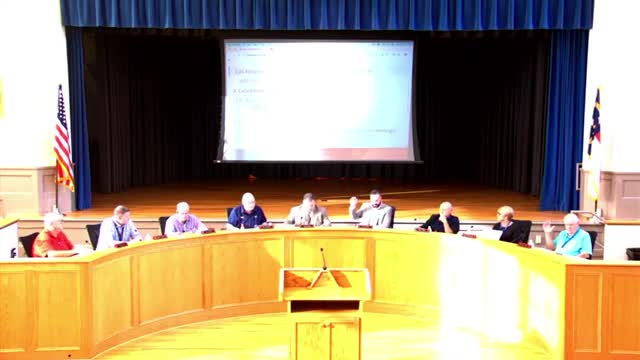Nonprofit proposes Marion School as foster-care support and counseling center; board moves to consult attorney
Get AI-powered insights, summaries, and transcripts
Subscribe
Summary
A nonprofit group presented plans to repurpose the vacant Marion School building as a foster‑care support and counseling center during a special meeting of the Cleveland County Board of Education on Oct. 7, and the board voted to enter a closed session to consult its attorney about the property.
A nonprofit group presented plans to repurpose the vacant Marion School building as a foster-care support and counseling center during a special meeting of the Cleveland County Board of Education on Oct. 7, and the board voted to enter a closed session to consult its attorney about the property.
Jeff Marburger, founder of the 1 More, 1 Less project, told the board the organization envisions three primary uses for Marion School: connecting foster and adoptive families with local churches across North Carolina, partnering with a counseling organization to provide on-site therapy offices, and operating community recreation and after-school space. “Our vision is threefold for this building,” Marburger said, saying the group would use portions of the building as demand grows rather than renovate the entire facility at once.
Marburger said the organization had received a $750,000 grant and planned a capital campaign to raise an additional $750,000. He described the school as roughly 68,000 square feet and said the group’s designed programmatic footprint started around 17,000 square feet, with plans to “grow into the building.” He said the group is not a licensing agency and does not plan to house children on site: “Do you plan to house kids in that particular facility? No, sir. No, sir. We would never,” a board member read back during questioning and Marburger confirmed.
Board members and several residents questioned the proposal’s timing and the district’s long-term facility needs. Public commenters said they first learned of the proposal shortly before the meeting and urged the board to hold additional public hearings before making disposal decisions. Ginny Ross, a speaker during the public-comment period, said the proposal materials were not available on the posted agenda for most of the day: “I was not aware of what we were talking about with Marion School until about 4:45,” she said, and asked the board to allow more time for review and comment.
Other residents pressed the board about enrollment pressures at nearby schools. One commenter said Jefferson and James Love are at or over target capacity and noted that students already are in mobile units. “There’s not any more room at Jefferson because my grandchild’s in a mobile unit,” speaker Shay Tiernan said, asking where children from new housing developments will attend school if Marion is sold.
Board members asked Marburger about historic preservation, aesthetics and zoning. A board member noted the Belvedere neighborhood’s historic character and asked whether the group would preserve the school’s appearance; Marburger said the group would “definitely refurbish inside and the outside to clean and add aesthetics” and would not tear down the facility. Board members also discussed conditional‑use permits and zoning limits; one board member said the district’s attorney indicated a conditional use or deed restrictions could limit future commercial redevelopment.
During the meeting the board chair said legal staff had identified a route to sell the property directly to the group under state historic‑property law rather than place the building on open bid, which some members described as a way to control future uses. The board then voted to go into closed session “to consult with the attorney about the property at Marion School” under N.C. General Statute 143‑318.11(a)(3). The motion was seconded by Board member Grama; on the record the chair read “All those in favor? It’s 90,” which the transcript records verbatim when the vote was announced. The board left open the possibility of motions after the closed session; the chair had asked members to refrain from making motions until legal issues were discussed.
Members of Marburger’s team who appeared with him included Robbie Gaines (special needs director), Courtney Wilson (prayer director), Chris Gray (project director) and Amy Bridges (community care director). Marburger said the group has worked with Hoke Enterprises and Upland Architect on plans and had been referred to Marion School by local contacts including Brandon Rupp and Chris Green. He also said a counseling partner that currently operates campuses in Spindale and what was transcribed as Bridal Springs, and Lincolnton, would move its home office into the Marion building if the project proceeds.
Residents and board members asked for further community engagement and for the district to evaluate enrollment projections and alternative uses before disposing of the facility. Several speakers urged the board to consult social services and local school‑planning documents before final decisions are made. The board moved into closed session at the end of the public-comment period to consult counsel on property‑disposition options and zoning constraints; next steps will depend on legal advice and any subsequent public meetings or board action.
